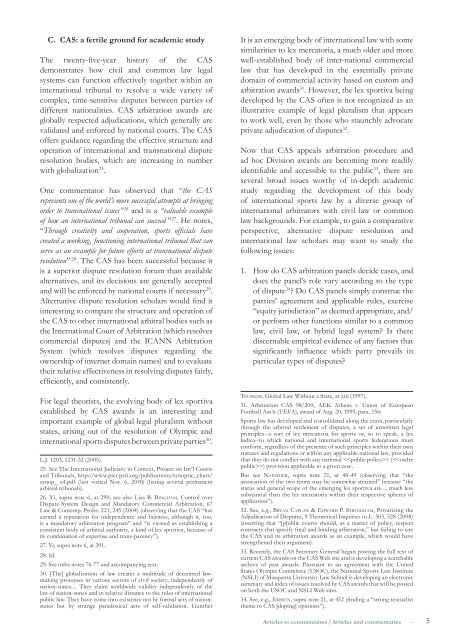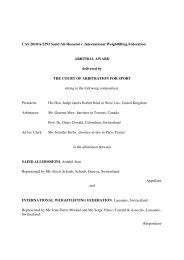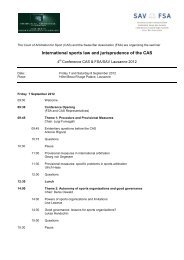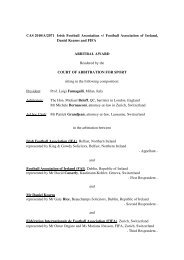(CAS) Bulletin - Tribunal Arbitral du Sport / TAS
(CAS) Bulletin - Tribunal Arbitral du Sport / TAS
(CAS) Bulletin - Tribunal Arbitral du Sport / TAS
Create successful ePaper yourself
Turn your PDF publications into a flip-book with our unique Google optimized e-Paper software.
C. <strong>CAS</strong>: a fertile ground for academic study<br />
The twenty-fi ve-year history of the <strong>CAS</strong><br />
demonstrates how civil and common law legal<br />
systems can function effectively together within an<br />
international tribunal to resolve a wide variety of<br />
complex, time-sensitive disputes between parties of<br />
different nationalities. <strong>CAS</strong> arbitration awards are<br />
globally respected adjudications, which generally are<br />
validated and enforced by national courts. The <strong>CAS</strong><br />
offers guidance regarding the effective structure and<br />
operation of international and transnational dispute<br />
resolution bodies, which are increasing in number<br />
with globalization 25 .<br />
One commentator has observed that “the <strong>CAS</strong><br />
represents one of the world’s more successful attempts at bringing<br />
order to transnational issues” 26 and is a “valuable example<br />
of how an international tribunal can succeed ” 27 . He notes,<br />
“Through creativity and cooperation, sports offi cials have<br />
created a working, functioning international tribunal that can<br />
serve as an example for future efforts at transnational dispute<br />
resolution” 28 . The <strong>CAS</strong> has been successful because it<br />
is a superior dispute resolution forum than available<br />
alternatives, and its decisions are generally accepted<br />
and will be enforced by national courts if necessary 29 .<br />
Alternative dispute resolution scholars would fi nd it<br />
interesting to compare the structure and operation of<br />
the <strong>CAS</strong> to other international arbitral bodies such as<br />
the International Court of Arbitration (which resolves<br />
commercial disputes) and the ICANN Arbitration<br />
System (which resolves disputes regarding the<br />
ownership of internet domain names) and to evaluate<br />
their relative effectiveness in resolving disputes fairly,<br />
effi ciently, and consistently.<br />
For legal theorists, the evolving body of lex sportiva<br />
established by <strong>CAS</strong> awards is an interesting and<br />
important example of global legal pluralism without<br />
states, arising out of the resolution of Olympic and<br />
international sports disputes between private parties 30 .<br />
L.J. 1203, 1231-32 (2005).<br />
25. See The International Judiciary in Context, Project on Int’l Courts<br />
and <strong>Tribunal</strong>s, http://www.pict-pcti.org/publications/synoptic_chart/<br />
synop_ c4.pdf (last visited Nov. 6, 2010) (listing several permanent<br />
arbitral tribunals).<br />
26. Yi, supra note 6, at 290; see also Lisa B. BINGHAM, Control over<br />
Dispute-System Design and Mandatory Commercial Arbitration, 67<br />
Law & Contemp. Probs. 221, 245 (2004) (observing that the <strong>CAS</strong> “has<br />
earned a reputation for independence and fairness, although it, too,<br />
is a mandatory arbitration program” and “is viewed as establishing a<br />
consistent body of arbitral authority, a kind of lex sportiva, because of<br />
its combination of expertise and trans-parency”).<br />
27. Yi, supra note 6, at 291.<br />
28. Id.<br />
29. See infra notes 76-77 and accompanying text.<br />
30. [The] globalization of law creates a multitude of decentred lawmaking<br />
processes in various sectors of civil society, independently of<br />
nation-states.... They claim worldwide validity independently of the<br />
law of nation-states and in relative distance to the rules of international<br />
public law. They have come into existence not by formal acts of nationstates<br />
but by strange paradoxical acts of self-validation. Gunther<br />
It is an emerging body of international law with some<br />
similarities to lex mercatoria, a much older and more<br />
well-established body of inter-national commercial<br />
law that has developed in the essentially private<br />
domain of commercial activity based on custom and<br />
arbitration awards 31 . However, the lex sportiva being<br />
developed by the <strong>CAS</strong> often is not recognized as an<br />
illustrative example of legal pluralism that appears<br />
to work well, even by those who staunchly advocate<br />
private adjudication of disputes 32 .<br />
Now that <strong>CAS</strong> appeals arbitration proce<strong>du</strong>re and<br />
ad hoc Division awards are becoming more readily<br />
identifi able and accessible to the public 33 , there are<br />
several broad issues worthy of in-depth academic<br />
study regarding the development of this body<br />
of international sports law by a diverse group of<br />
international arbitrators with civil law or common<br />
law backgrounds. For example, to gain a comparative<br />
perspective, alternative dispute resolution and<br />
international law scholars may want to study the<br />
following issues:<br />
1. How do <strong>CAS</strong> arbitration panels decide cases, and<br />
does the panel’s role vary according to the type<br />
of dispute 34 ? Do <strong>CAS</strong> panels simply construe the<br />
parties’ agreement and applicable rules, exercise<br />
“equity jurisdiction” as deemed appropriate, and/<br />
or perform other functions similar to a common<br />
law, civil law, or hybrid legal system? Is there<br />
discernable empirical evidence of any factors that<br />
signifi cantly infl uence which party prevails in<br />
particular types of disputes?<br />
TEUBNER, Global Law Without a State, at xiii (1997).<br />
31. Arbitration <strong>CAS</strong> 98/200, AEK Athens v. Union of European<br />
Football Ass’n (UEFA), award of Aug. 20, 1999, para. 156:<br />
<strong>Sport</strong>s law has developed and consolidated along the years, particularly<br />
through the arbitral settlement of disputes, a set of unwritten legal<br />
principles--a sort of lex mercatoria for sports or, so to speak, a lex<br />
ludica--to which national and international sports federations must<br />
conform, regardless of the presence of such principles within their own<br />
statutes and regulations or within any applicable national law, provided<br />
that they do not confl ict with any national () provision applicable to a given case.<br />
But see NAFZIGER, supra note 21, at 48-49 (observing that “the<br />
association of the two terms may be somewhat strained” because “the<br />
status and general scope of the emerging lex sportiva are ... much less<br />
substantial than the lex mercatoria within their respective spheres of<br />
application”).<br />
32. See, e.g., BRYAN CAPLAN & EDWARD P. STRINGHAM, Privatizing the<br />
Adjudication of Disputes, 9 Theoretical Inquiries in L. 503, 528 (2008)<br />
(asserting that “[p]ublic courts should, as a matter of policy, respect<br />
contracts that specify fi nal and binding arbitration,” but failing to cite<br />
the <strong>CAS</strong> and its arbitration awards as an example, which would have<br />
strengthened their argument).<br />
33. Recently, the <strong>CAS</strong> Secretary General began posting the full text of<br />
current <strong>CAS</strong> awards on the <strong>CAS</strong> Web site and is developing a searchable<br />
archive of past awards. Pursuant to an agreement with the United<br />
States Olympic Committee (USOC), the National <strong>Sport</strong>s Law Institute<br />
(NSLI) of Marquette University Law School is developing an electronic<br />
summary and index of issues resolved by <strong>CAS</strong> awards that will be posted<br />
on both the USOC and NSLI Web sites.<br />
34. See, e.g., ERBSEN, supra note 21, at 452 (fi nding a “strong textualist<br />
theme in <strong>CAS</strong> [doping] opinions”).<br />
Articles et commentaires / Articles and commentaries<br />
-<br />
5





